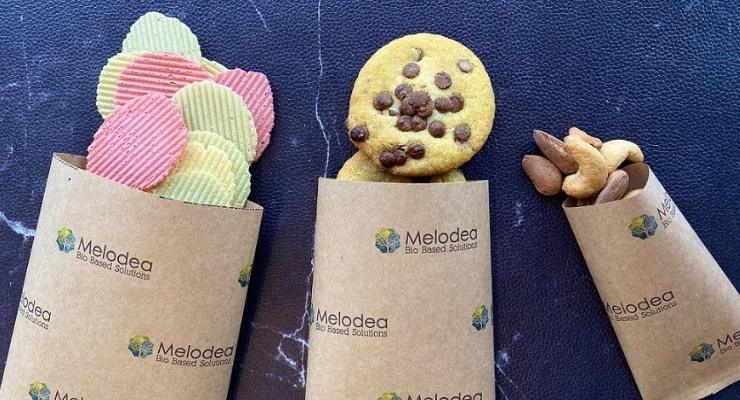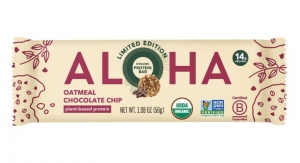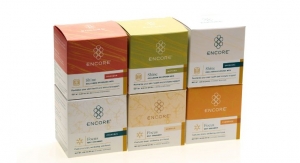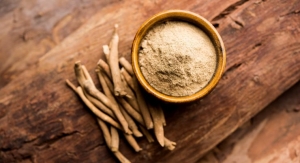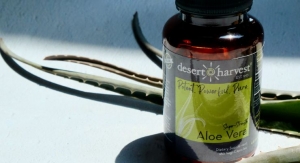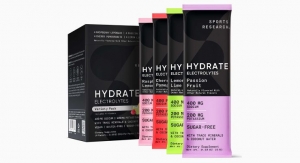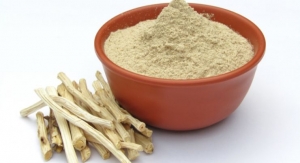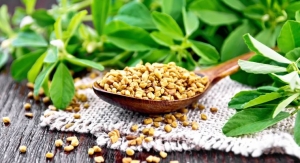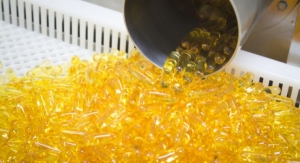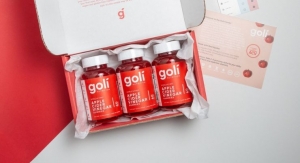11.09.22
Green technology startup company Melodea announced that it has launched its plastic-free packaging technology in the U.S., and is increasing its production capacity to serve both U.S. and South American markets.
Single-use packaging is one of the largest contributors to the millions of tons of plastic waste generated annually, the company reports. Melodea produces a barrier coating material sourced from wood pulp, a side stream of the paper industry. The cellulose nanocrystals it produces can coat paper in order to maintain freshness for food, beverage, and other consumer goods in paper packages, where it acts as a barrier to prevent transmission of oxygen, water, oil, or grease.
The sturdy, lightweight material can act as an alternative to plastic or aluminum for maintaining the quality and integrity of packaged foods. As a forestry byproduct, it is also biodegradable, fully recyclable, and non-toxic to people and the environment. Currently, the material is being used for paper-based pouches, lids, molded pulp trays, and more.
Melodea will operate a manufacturing plant in the U.S. for two of its products: MelOx, which protects packaged goods from oxygen, oil, and grease; and VBCoat, which counteracts the transmission of water, oil, and grease. All of Melodea’s barrier coatings are in compliance with FDA regulations for food packaging.
“CNC from naturally abundant and renewable cellulose is emerging as one of the most promising green solutions to help replace environmentally harmful materials,” said Shaul Lapidot, CEO and co-founder of Melodea. “The new plant, combined with our newly established ties in the US, can potentially triple our manufacturing capacity to meet amplified demands. It also will shorten the travel and subsequent carbon footprint by bringing production closer to our main markets in South America and the US.”
Melodea recently entered into a commercial agreement with a major manufacturer of plant-based fiber ingredients to eliminate single-use plastics, the company reports. It will also produce and market packaging products with Melodea’s VBcoat moisture barrier, the first of which is a molded pulp tray for leafy greens. The company expects it will be ready to start shipping locally from the U.S. site within the next three to six months.
The company has thus far raised a total of $20 million in capital, after being founded as a spinoff project initiated at the Hebrew University of Jerusalem in 2010 in Israel, by Dr. Paul Lapidot, Tord Andres, and Oded Shoseyov, PhD. Melodea’s technology is protected by 14 patents and was a winner of the Packaging Europe 2019 sustainability award.
“CNC is the ideal environmentally sound solution, delivering high-performance ‘clean and green’ paper-based packaging products,” said Zvika Weiss, CFO of Melodea. “Our CNC is sustainably produced, recycling about 95% of the materials in the process, and its superior performance has been verified by academic research. CNC has great potential to turn the tide on the cascade of negative impacts from plastic pollution that have been a pressing environmental issue for too long.”
Single-use packaging is one of the largest contributors to the millions of tons of plastic waste generated annually, the company reports. Melodea produces a barrier coating material sourced from wood pulp, a side stream of the paper industry. The cellulose nanocrystals it produces can coat paper in order to maintain freshness for food, beverage, and other consumer goods in paper packages, where it acts as a barrier to prevent transmission of oxygen, water, oil, or grease.
The sturdy, lightweight material can act as an alternative to plastic or aluminum for maintaining the quality and integrity of packaged foods. As a forestry byproduct, it is also biodegradable, fully recyclable, and non-toxic to people and the environment. Currently, the material is being used for paper-based pouches, lids, molded pulp trays, and more.
Melodea will operate a manufacturing plant in the U.S. for two of its products: MelOx, which protects packaged goods from oxygen, oil, and grease; and VBCoat, which counteracts the transmission of water, oil, and grease. All of Melodea’s barrier coatings are in compliance with FDA regulations for food packaging.
“CNC from naturally abundant and renewable cellulose is emerging as one of the most promising green solutions to help replace environmentally harmful materials,” said Shaul Lapidot, CEO and co-founder of Melodea. “The new plant, combined with our newly established ties in the US, can potentially triple our manufacturing capacity to meet amplified demands. It also will shorten the travel and subsequent carbon footprint by bringing production closer to our main markets in South America and the US.”
Melodea recently entered into a commercial agreement with a major manufacturer of plant-based fiber ingredients to eliminate single-use plastics, the company reports. It will also produce and market packaging products with Melodea’s VBcoat moisture barrier, the first of which is a molded pulp tray for leafy greens. The company expects it will be ready to start shipping locally from the U.S. site within the next three to six months.
The company has thus far raised a total of $20 million in capital, after being founded as a spinoff project initiated at the Hebrew University of Jerusalem in 2010 in Israel, by Dr. Paul Lapidot, Tord Andres, and Oded Shoseyov, PhD. Melodea’s technology is protected by 14 patents and was a winner of the Packaging Europe 2019 sustainability award.
“CNC is the ideal environmentally sound solution, delivering high-performance ‘clean and green’ paper-based packaging products,” said Zvika Weiss, CFO of Melodea. “Our CNC is sustainably produced, recycling about 95% of the materials in the process, and its superior performance has been verified by academic research. CNC has great potential to turn the tide on the cascade of negative impacts from plastic pollution that have been a pressing environmental issue for too long.”

